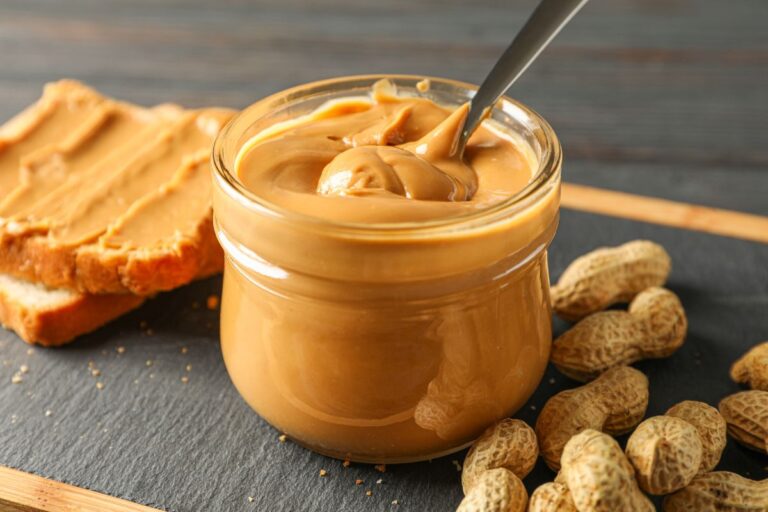Does peanut butter go bad? Yes, it can.
This revelation might strike as a minor apocalypse in the realm of pantry staples; after all, peanut butter’s reputation as a durable, almost timeless ally in the kitchen is well-documented. But let’s dive deep into this topic, beyond the surface-level acceptance of expiration dates, to understand not just the ‘how’ and ‘why’, but the ‘what now’ of peanut butter’s lifespan.
Learn about peanut butter expiration
- Yes, peanut butter can go bad.
- It can last for up to a year.
- Proper storage is key.
What Makes Peanut Butter Go Bad?
The journey of a jar of peanut butter from the supermarket shelf to potentially becoming a science experiment is fraught with variables. These range from the type of peanut butter (natural versus processed) to how it’s stored. A natural peanut butter, with its lack of stabilizers, is more prone to oil separation and spoilage, while its more processed counterparts boast a longer shelf life thanks to added preservatives.
The nuances of peanut butter degradation are a testament to the complexity of food preservation. From the onset of rancidity due to oil oxidation to the potential growth of mold if water finds its way inside the jar, the signs are there, whispering the need for vigilance.
How Long Does Peanut Butter Last?
When unopened, most jars of peanut butter can last 9-12 months in the pantry. Once the seal is broken, a natural peanut butter, with its flirtatious layer of oil at the top, will stay fresh for 2-3 months in the pantry but can stretch to 6 months if refrigerated. Its processed counterpart, however, can enjoy a pantry life of 6-9 months post-opening. These are, of course, rough estimates and can vary based on storage conditions and brand.
The longevity of peanut butter is a marvel of food science, a blend of natural preservation properties of the peanuts themselves, coupled with human ingenuity in the form of stabilizers and packaging. It’s a testament to how far we’ve come from the days of salting and smoking to preserve our provisions.
How to Store Peanut Butter
Storing peanut butter is less about rocket science and more about common sense. For unopened jars, a cool, dry pantry shelf away from direct sunlight is ideal. Once opened, the debate between refrigeration and pantry storage heats up, especially for natural peanut butter. Here’s the scoop: refrigeration will extend the life of your peanut butter but at the cost of making it harder to spread. Processed peanut butter, with its stabilizers, is more forgiving and can remain in the pantry without turning into a petri dish of mold.
💡 Tip: To prevent natural peanut butter from separating, store the jar upside down. This allows the oil to distribute more evenly.
How to Tell if Peanut Butter Has Gone Bad
The tell-tale signs of spoiled peanut butter are hard to miss. A change in texture, color, or an off-putting smell are your first clues. If the peanut butter smells rancid or sour, it’s time to bid farewell. Additionally, the presence of mold, which can occur if moisture has infiltrated the jar, is a clear signal to discard the jar immediately.
But let’s talk about the oil. Separation is natural, especially in natural peanut butter. However, if the oil smells bad or the peanut butter beneath has dried out, these are signs of spoilage. Trust your senses; they are your best tools in assessing food safety.
Can You Get Sick from Eating Expired Peanut Butter?
The short answer is yes, but it’s complicated.
Eating expired peanut butter can expose you to the risk of foodborne illnesses, especially if mold has developed. However, ‘expired’ and ‘spoiled’ are not always synonymous; a jar past its expiration date but stored properly and showing no signs of spoilage might still be safe to eat. The key here is vigilance and erring on the side of caution.
The Best Way to Use Up Old Peanut Butter
Before your peanut butter reaches the point of no return, consider these creative ways to use it up. From blending it into smoothies to whipping up a batch of peanut butter cookies, there are plenty of ways to ensure not a drop goes to waste. Even savory dishes, like peanut sauces for noodles or as a marinade for meats, can benefit from that nearly-forgotten jar in the back of your pantry.
💡 Tip: Peanut butter adds a creamy, rich texture to smoothies, making them more filling and nutritious.
In conclusion, peanut butter, like all good things, doesn’t last forever, but with proper storage and a keen eye on its condition, you can extend its shelf life and enjoy every last spoonful. Whether it’s employing it in a variety of recipes or understanding when it’s time to let go, peanut butter remains a versatile and beloved staple in kitchens around the world. The journey from the pantry to the plate doesn’t have to end in spoilage; with a bit of knowledge and creativity, every jar of peanut butter can reach its delicious potential.
Frequently Asked Questions
How can you tell if peanut butter has gone bad?
You can check for any changes in color, smell, or taste.
What are signs that peanut butter is spoiled?
Mold growth, rancid smell, or off taste indicate spoilage.
How can you extend the shelf life of peanut butter?
Store it in a cool, dry place away from sunlight.
What if my peanut butter looks separated?
Simply stir it well until it reaches a smooth consistency.
How long does unopened peanut butter last?
The shelf life of peanut butter depends on whether it is opened or not, and what kind of peanut butter it is. Unopened peanut butter can stay good for 6 to 24 months, while opened peanut butter usually lasts for 2 to 3 months. Natural peanut butter, which does not have any preservatives, can last for a few months unopened, but only about a month once opened.
What if my peanut butter is past its best by date?
It is likely still safe to consume if it shows no signs of spoilage.
Better Living uses affiliate links. If you make a purchase through them, we may receive a small commission (for which we are deeply grateful) at no cost to you.



